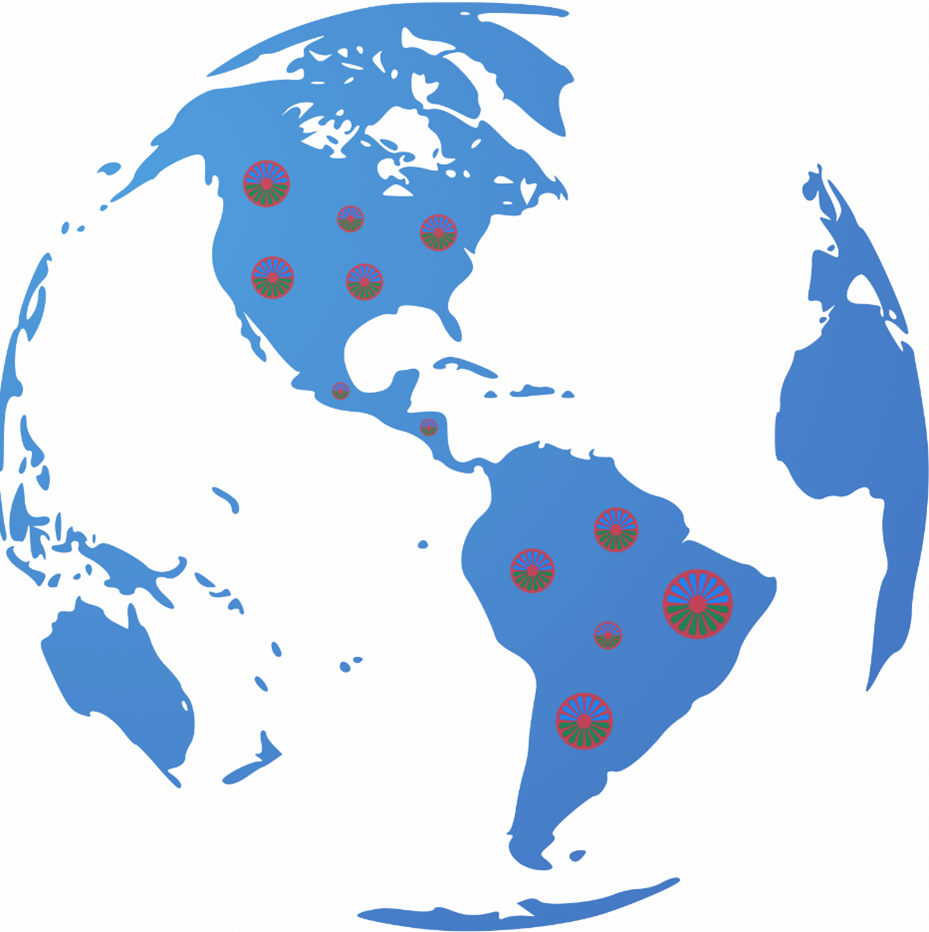推进罗姆人融入社会
人权高专办与少数群体
80th Anniversary of the Roma Holocaust Commemoration Year
Launch Announcement
Romani Memory Map in the Americas
8 April 2024
Today, on the occasion of International Roma Day 2024, a coalition of partners launched the Romani Memory Map for the Americas. The Romani Memory Map for the Americas is a crowd-sourced initiative mapping Romani community memory points. The Map is available on the following links:
The Romani Memory Map for the Americas is hosted on the website of Gonzaga University Center for Global Engagement (English-language version), the Institute of Anthropological Sciences of the University of Buenos Aires (Spanish-language version) and the Associação International Mayle Sara Kali (Portuguese language version). The UN Human Rights Office (OHCHR) coordinates this crowd-sourced initiative.
Also on 8 April, the Call for Inputs to submit materials for the map was relaunched, with a new deadline for submissions of 15 July 2024.
Background
The Romani Memory Map for the Americas builds on OHCHR’s work on memorialization and antigypsyism, and was a specific commitment of the May 2023 roundtable on memorialization as a strategy to tackle antigypsyism in the Americas. OHCHR’s work on Roma rights – including addressing antigypsyism, the specific form of racism facing Roma -- is underpinned by the 2015 report by the UN Special Rapporteur on Minority Issues. This work also builds on the insights of the UN Special Rapporteur on the promotion of truth, justice, reparation and guarantees of non-recurrence, who noted, in a 2020 report:
“… the crucial role played by memorialization processes in the context of transitional justice, which is fully recognized by the rules and standards of contemporary international law. The work carried out on these past violations serves as a basis for reflection on the present and identification of contemporary issues related to exclusion, discrimination, marginalization and abuses of power, which are often linked to toxic political cultures. Positive work in the area of memory not only helps to build democratic cultures in which human rights are respected but also fulfils the legal obligation of States to guarantee human rights.”
Process
In July 2023, a call for inputs to the Romani Memory Map for the Americas was launched.
Two independent review bodies – an Expert Panel and a Review Board -- involving Roma human rights defenders from the Americas and academic institutions have been convened to review the materials submitted in response to the call for inputs. The review bodies carried out detailed consultations, assessing inputs and carefully vetting materials according to criteria including appropriateness, historical accuracy, to ensure a human rights-basis and to review according to the principle of do-no-harm.
On the basis of this review, 29 Romani Memory Points from throughout the Americas have been included in this first iteration of the Map. A full process summary is available at link.
Contacts
Inquiries please to: aline.miklos@un.org and/or claude.cahn@un.org.
Memorialization as a Strategy to Tackle Antigypsyism
Action Program 2024
During 2-3 August 1944, the administrators of the Auschwitz-Birkenau Nazi death camp closed the "Zigeunerlager", the part of the camp in which Roma were interred. During these days, more than 3,000 Roma were killed, including women, children and older people. Today, 2 August is honoured as the international day commemorating the Roma Holocaust. 2 August 2024 will mark the 80th anniversary commemorations of the Roma Holocaust.
The August 2024 80th anniversary commemorations of the Roma Holocaust are an opportunity to strengthen government, civil society and other public engagement for memorialization, as well as to capacitate Roma human rights defenders to engage to address human rights issues facing Roma, and to highlight the impact of antigypsyism. The road to and following the 2 August 2024 anniversary presents extensive opportunities for awareness-raising, as well as to advance Roma rights, Roma inclusion, challenging anti-gypsyism, and advancing public understanding and public memory as concerns human right issues facing Roma worldwide. OHCHR will work with partners before, during and after the 80th anniversary commemorations, in a range of actions aimed at strengthening human rights work to address antigypsyism and encouraging the implementation of public memorialization policies at national levels.
Background
The situation of Roma worldwide, with particular focus on anti-gypsyism, is the subject of a 2015 report by the UN Special Rapporteur on Minority Issues.
The persecution and exclusion of the Roma did not begin with Nazism and did not end with it. Recent studies show that Roma experience very high levels of discrimination and hostility in Europe and in the Americas. Violations of the human rights of Roma are reported in practically all areas of life: education, health, housing, work, access to services and in other spheres of life. This situation is primarily the result of the antigypsyism, the specific form of racism facing Roma. Outbreaks of anti-Roma racism have plagued every European society without exception, and antigypsyism is present on other continents as well. In the Americas, prejudice and discrimination also marked the trajectory of Romani families since their arrival in the 16th century, subjecting them to persecution, deportation and antigypsy legislation enacted by successive governments. In times of crisis, as was the case with the COVID19 pandemic and the armed conflicts in Syria and Ukraine, prejudice and stigmatization increase, and with them heightened risk of human rights abuse.
In the coming period, further details of action will be published here, beginning with the launch in January 2024 of a crowd-sourced online Romani Memory Map for the Americas.
Contacts: aline.miklos@un.org and claude.cahn@un.org.
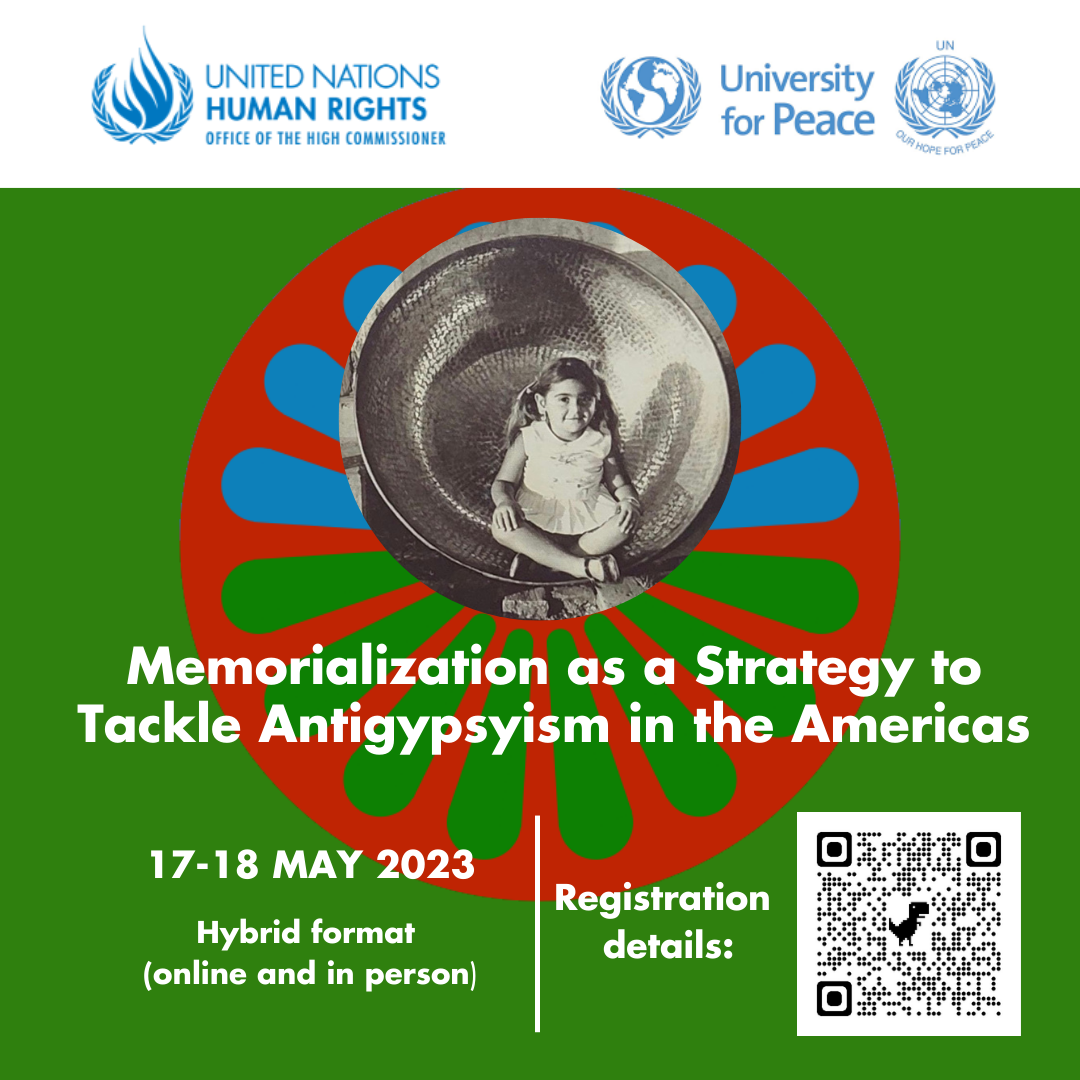
Roundtable
Memorialization as a Strategy to Tackle Anti-Gypsyism in the Americas
17-18 May 2023
UPEACE, Costa Rica
The Indigenous Peoples and Minorities Section (IPMS) of the Office of the United Nations High Commissioner for Human Rights (OHCHR) and the University for Peace (UPEACE) is organizing the international roundtable event on "Memorialization as a Strategy to tackle Anti-Gypsyism in the Americas" on May 17-18, 2023. The event will be held in San José, Costa Rica, and in hybrid format (in person and online).
The roundtable is done with the involvement of the United Nations Special Rapporteur on Minority Issues and in partnership with civil society organizations.
The roundtable aims to follow up on the UN's global efforts to consolidate the rights of Roma people and combat antigypsyism, its historical roots and its impact on the present. The event also aims to take stock of the current state of Roma inclusion policies in the Americas and to encourage the processes of construction and valorization of the memory of this people in public and private spaces.
The online aspect of the roundtable will take place via ZOOM and is free and open to the public, but registration is mandatory. Once registered, you will receive instructions on how to join this event.
Interpretation to and from Spanish and English is provided.
The event will be public and the online meeting will be broadcast on UPEACE Youtube Channel.
To attend the event, please kindly register below.
For further information, please see: Concept Note (PDF)
For any questions related to registrations please contact Aline Miklos: fellow.miklos@un.org
The organizers look forward to your questions and active participation.
Roma rights in pictures
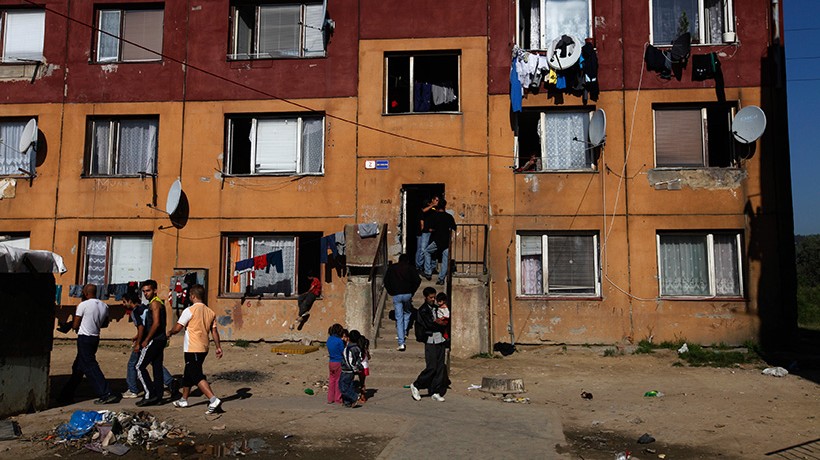
Romani slum "Na Demetri", Kosice, Slovakia.
Photo credit: © REUTERS/Petr Josek
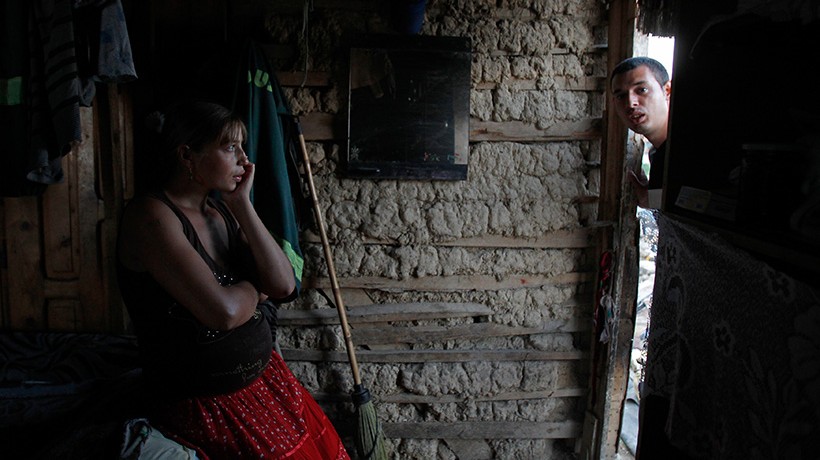
Craica slum, Baia Mare, Romania.
Photo credit: © REUTERS/Bogdan Cristel
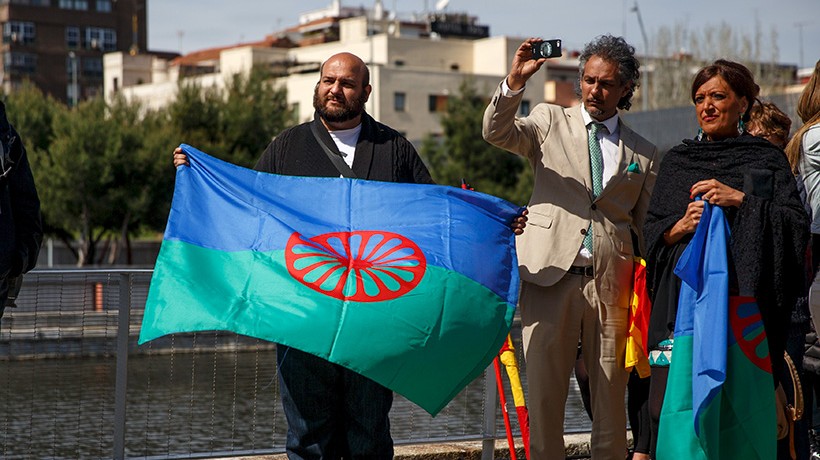
Celebration of International Roma Day April 8, 2015, in Madrid, Spain.
Photo credit: © REUTERS/Andrea Comas
罗姆人和游民在生活的许多领域都面临着广泛的歧视(而且往往是被隔离),包括:
- 警务
- 司法系统
- 住房
- 教育
- 就业
- 健康
在一些国家,罗姆儿童在被国家接管照顾的儿童中的比例明显过高。人们普遍否认存在对罗姆人的种族主义歧视。
根据人权理事会的一项决议,联合国人权办于2015年支持了少数群体问题特别报告员编写的一份关于全世界罗姆人人权状况的全球研究报告。人权理事会的决议和研究报告承认,反吉普赛主义--罗姆人面临的特定形式的种族主义--构成了让罗姆人能成功融入社会和充分尊重其人权的主要障碍。
联合国人权办在一些国家开展工作,以进一步有效落实罗姆人和游民的人权。为此目的,办事处协助制定政府关于罗姆人融入问题的政策,增强罗姆人(特别是罗姆人妇女)参与地方、区域、国家和国际问题决策的能力。办事处还努力反对歧视与虐待的模式和做法。来自世界各国罗姆人权利活动家还参加了人权高专办的少数群体研究金方案。
另见人权高专办处理强迫驱逐罗姆人和游民*的出版物(2014年)。
Related links
Roma mediators in Moldova enable Roma families to enjoy their human rights
13 September 2024
Story: Roma: Holocaust anniversary draws painful memories and hope for more rights
28 August 2024
Call for Inputs: Romani Memory Map for the Americas
Deadline 15 June 2024
Story: Memorializing the Romani past: “We exist, respect our humanity"
8 April 2024
